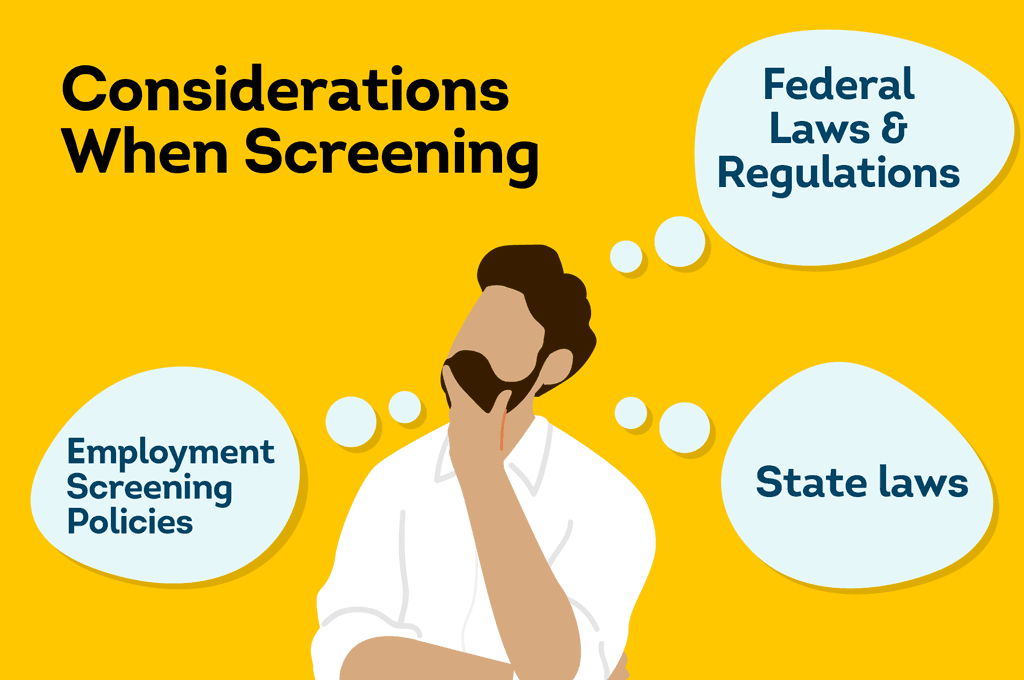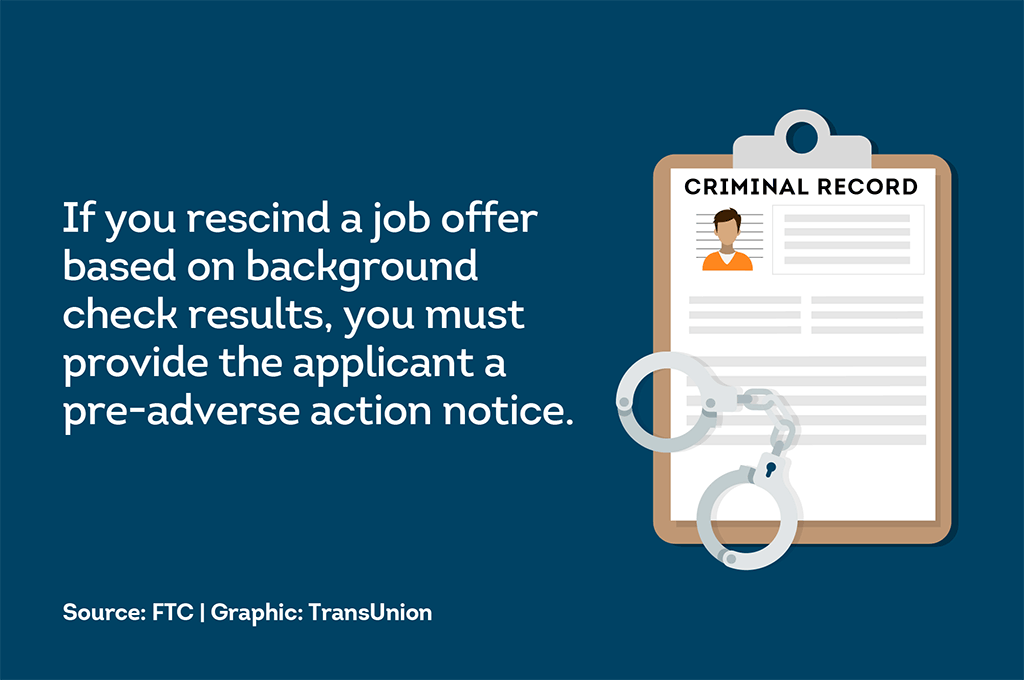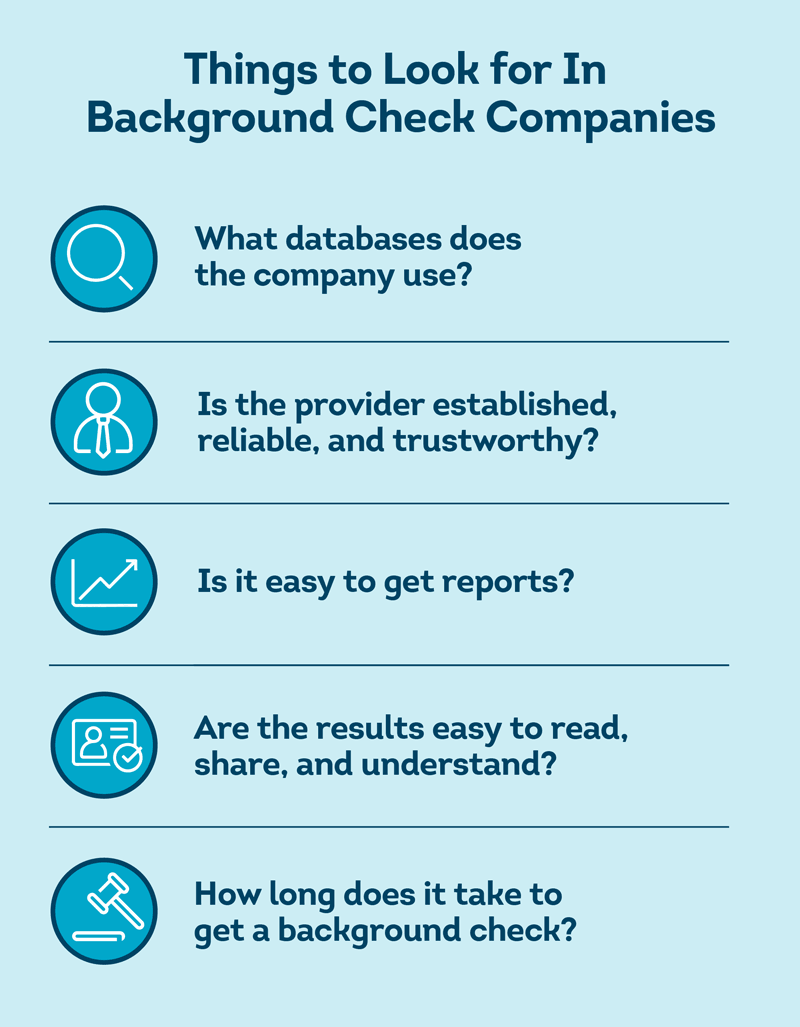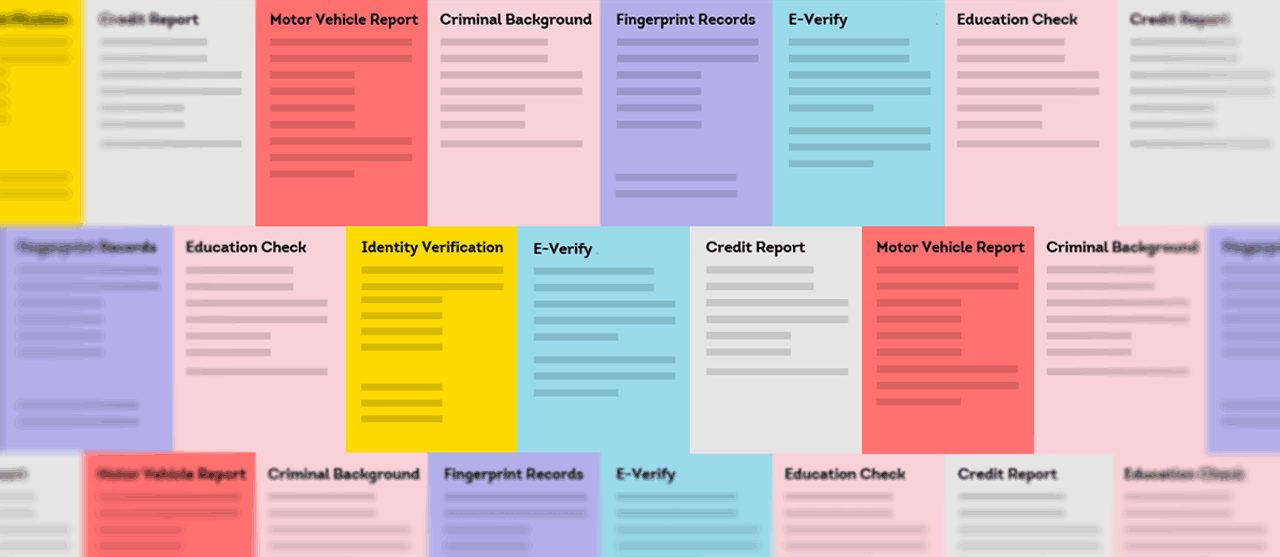Concerns on an employee background check are signs your screening process works. However, before you reject a candidate due to the information contained in a background check, it’s essential to verify the report data actually belongs to your candidate, give the candidate a chance to explain the findings, and follow all applicable laws while taking any adverse action.
Disclosure: This content, except as otherwise indicated or stated on this site, is the property of TransUnion Rental Screening Solutions, Inc. This content is for educational purposes and for convenience only. Trademarks used are the property of their respective owners, and no endorsement or affiliation is implied. The information presented in this content is “as is” without warranties of any kind, and specifically is not represented to be complete and does not constitute legal advice, and is subject to change without notice. You are encouraged to check these terms from time to time for changes, and by accessing this site you agree to these terms and all terms listed. Laws and regulations may vary by state and locality. Consult your own counsel if you have legal questions related to your rental property practices and processes.
Disclaimer: Remember that this material is intended to provide you with helpful information and is not to be relied upon to make decisions, nor is this material intended to be or construed as legal advice. You are encouraged to consult your legal counsel for advice on your specific business operations and responsibilities under applicable law. Trademarks used in this material are the property of their respective owners and no affiliation or endorsement is implied.
It was an absolute shock: you offered your top candidate the job. Only, their background check revealed more information than the Mighty Mississippi. Now, you’re stuck. You don’t want to hire someone with a criminal history, but you definitely don’t want to land in hot water by moving forward in a way that could cause potential harm. So, what can you do?
First, recognize that a background check hit is a sign that your screening process works. As a small business owner, your priority is protecting yourself—both from potentially concerning job applicants and from potential negligent hiring lawsuits that can occur if you mismanage the hiring process.
The best employees can improve productivity and increase your bottom line. On the other hand, hiring an unsuitable candidate could jeopardize your business brand, workplace safety, company culture, and financial success.
As many savvy employers know, it is crucial to have a pre-employee screening policy. It is crucial to have a pre-employee screening policy. Using a reputable pre-employment screening service like ShareAble® for Hires can help you identify candidates who could pose a threat to your livelihood.
That said, navigating a failed background check is a delicate process that takes precise action and adherence to federal, state, and local laws and regulations. However, it is far from impossible.
In the article below, you can learn some general principles and methods on how to rescind a contingent job offer if a candidate does not meet the background check requirements you established.
In this article:
DISCLAIMER: Please be mindful that we do not intend the infromation below to be complete or legal advise (and you should not treat it as complete or legal advise). Before following any of these tips, please consul your legal counsel for guidance based on federal, state and/or local laws, and to assist with any questions to determine how these tips may be conducted or impact you.
Consider Establishing Criteria for a “Failed” Background Check
What does “failing a background check” even mean? The answer can differ dramatically between employers and even jobs. Before starting your search, it’s helpful to first establish your criteria for “failing” a background check.
Refer to your employment screening policy and employee handbook to help determine what qualifies as acceptable and unacceptable for the position. Here are some questions to ask:
- Are the negative hits on the background check relevant to the company or position? For example, several traffic violations may not disqualify someone who works in retail, but may raise questions for positions that require driving or a company car.
- Does the hit disqualify the candidate from the position? Remember not all past hits are an automatic “no way.” It’s important to look at the circumstances of the charge, when it occurred, and what’s happened since to help make your decision.
Employers generally do ask questions about an individual’s employment, financial, and criminal history when making hiring decisions. However, the way you treat the information must comply with all applicable laws and regulations that protect applicants against unlawful discrimination, like the U.S. Equal Employment Opportunity Commission (EEOC).
The EEOC has guidelines for employers on how to use the background information obtained in a screening report. According to the EEOC, employers should:
- Apply the same standard to everyone, regardless of their race, national origin, color, sex, religion, disability, genetic information, or age (40 or older).
- Take special care when making employment decisions on background problems that are more common among people of certain demographics.
- Be prepared to make exceptions for problems revealed during a background check that were caused by a disability.

Even though background checks are widely accepted and commonly performed, it's important to pay attention to the Federal Trade Commission (FTC) and EEOC parameters.
Things to Keep in Mind Before Rescinding an Offer
If you do decide to rescind a job offer after a potential concern with the applicant’s criminal background check is revealed, here are some things to keep in mind:
- Stay current with state and federal regulations that govern the use of criminal records in background screening. For example, the Berkeley Institute for Research on Labor and Employment reports that over 36 states and 150 cities nationwide have adopted “ban the box” ordinances.
- These laws are designed to prevent employers from considering criminal history prior to offering a job in an effort to combat discrimination. One may or may not be in effect where your business is located, so it’s wise to research all local, state, and federal laws when creating your screening policy.
- It’s important for employers to understand the Fair Credit Reporting Act (FCRA), legislation which impacts the kind of “consumer data” that often shows up in different types of employment background checks.
- Use a hiring matrix to make consistent decisions. A hiring matrix is a tool used to objectively identify the best job applicant. You should consider creating a matrix of candidates, skills, education, experience, and any other attributes that provide a clearer picture of the best candidate for the position.
- To avoid unintended bias, job qualifications should be specific to the position without blanket policies, and applied consistently to all candidates.
- Assess applicants individually. In 2012, the EEOC added the requirement for individualized assessment in their guidance for employers. This was done to avoid a potentially discriminating impact in the event that a job offer is rescinded due to a background check.
Here are some circumstantial factors employers and hiring managers are urged to consider:
- Age and time of the offense
- Rehabilitation efforts
- Employment history before and after the offense
- Character references
Understand the adverse action and record dispute processes. These are two rights generally endowed to a candidate who has “failed” a background check after a job offer or during the hiring process. We’ll take a look at these two processes in the sections below.
Pro Tip: Interview scorecards are another great way to help assess and compare candidates more objectively. Learn how to create and what to include on these assessment tools.
Consider Verifying the “Failed” Background Report Belongs to Your Candidate
Be careful not to rescind the job offer after a background check until you verify that the records actually belong to your candidate. Sometimes, there may be a false positive match between a potential candidate and a different person by the same name.
Here are some tips to help confirm your match:
- Double-check the screening request for possible data-entry errors
- Use a reputable screening company
- Run identity verification to help confirm your applicant is really who they say they are
Without this kind of verification, your results may be inaccurate or incomplete.
Notifying the Candidate: Pre-Adverse Action
Even if you had a good gut feeling about a candidate, your employment screening process might turn up some potentially concerning history. Depending on the offense, negative hits could leave you figuring out how to rescind a job offer after a background check or wondering how you didn’t spot issues in the first place.
In fact, finding a job candidate with a criminal record is more common than you may think. According to the National Conference of State Legislatures, 1 in 3 American adults have a criminal record. This makes it especially important to run background checks on anyone you want to hire.

Assessing the Results and the Open Position
Along with verifying the record belongs to the correct person, you generally need to notify the candidate of your findings before you take adverse action. There are important steps you must follow in this process, including considering the crime and assessing its relevance to the duties of the position you’re hiring for.
- Scenario: You are hiring for an open position in your accounting department.
- Candidate 1: You run a credit check and discover a weak credit history, piles of debt, and maxed-out accounts.
- Candidate 2: You run a criminal record check, which reveals three traffic-related charges in the last seven years.
For both candidates, you should assess the information and determine if it could negatively impact their performance in a role with financial responsibility.
What to Do if You Decide to Rescind a Job Offer
As outlined in the FCRA guidelines, if you decide to rescind the job offer, then you likely need to provide the applicant with a "pre-adverse action notice". Pre-adverse action notices inform candidates and gives them a chance to explain their criminal history.
The candidate is allowed time to research your findings and dispute any potential inaccuracies. Employers are generally required to provide this opportunity for rebuttal.
During this step of the process, employers are also generally advised to provide the candidate with:
- A copy of their background report
- A copy of “A Summary of Your Rights Under the Fair Credit Reporting Act”
- The contact information of the screening agency responsible for conducting the consumer report
- A reasonable amount of time to dispute the results
Communicate with the Candidate & Make a Final Decision
After you’ve provided the pre-adverse action notice, you are generally required to give your candidate time to read and review the results of their background check.
How much time do you give candidates to correct criminal background check results? It depends. Check the laws applicable to you for more information any specifically-required amount of time. Also check that there are no state-specific laws that apply to your business that require even longer periods of time.
Here are a few potential outcomes of the pre-adverse action process:
- Your candidate disputes their criminal record, corrects errors or contests any perceived inaccuracies. If you approve the outcome of their explanation or dispute, then you typically may move forward with the hiring process.
- Your candidate disputes their criminal record and gets errors corrected. However, the updated report may still include other crimes that do not meet your screening requirements.
- Your candidate does not dispute the findings and the criminal report stands. In this case, you generally must make a final hiring decision.
If you don’t hear anything from the candidate in a legally-specified or required number of days, you might want to then proceed to adverse action—formally rescinding the offer.
Rescind the Job Offer with an Adverse Action Notice
When a job offer is rescinded due to a background check, employers generally need to formally retract the offer in writing with an adverse action notice. The written statement should comply with applicable state and federal law and typically will outline the reasons the decision was made, stating specifically that the offer is retracted per the result of a background check.
You also generally must provide the candidate a copy of the background check report within the adverse action notice, as well as the name of the company that conducted the screening.
Additionally, according to the FTC guide for businesses, when rescinding a job offer you might also have to inform the candidate of:
- The company that conducted the background check does not make the decision to pursue adverse action
- The candidate may request a free second copy of their background report within 60 days
- The candidate may still dispute the results of their background check
It’s wise to carefully document every step of the process when rescinding a job after a background check, to show you’ve followed the correct procedure. Failure to follow these protocols may lead to an applicant filing a complaint.
As you learn more about how to rescind a job offer, remember that the formalities are incredibly important. Especially for small businesses, lawsuits should tried to be avoided at all costs—as an employee lawsuit is costly and typically takes a long time to resolve.
The stress and expense involved in a year-or-more-long legal battle can be a huge hit to employers—not to mention the precious time it can take away from running and expanding your business. And, if your screening practices are found to be non-compliant with applicable state and federal laws, you could be looking at huge fees and penalties that can further eat away at your bottom line.
Pro Tip: Background checks aren’t the only documents you should be keeping. Learn about the three essential employee files and what each needs to be included in each.
Learn How to Run Criminal Background Checks
Pre-employment screening is essential. Without it, you could fail to learn about a candidate’s criminal history, which could lead to hiring an employee that may not meet your screening criteria. In public-facing environments, you need to have faith that your employee will uphold your brand and values while delivering exemplary service.
Quality background checks help prevent risks such as internal theft, property negligence, and issues with customers. However, not all background checks—or even screening policies—are created equally.
Learning how to conduct appropriate criminal background checks should be one of your top priorities. Poorly managed background checks can leave you vulnerable to potential lawsuits and derail your hiring process.
Several companies offer some form of “employment screening” and you must be very selective when deciding which one to use.
Here’s what to look for in background check companies:
- What databases does the company use?
- Is the provider established, reliable, and trustworthy?
- Is it easy to get reports?
- Are the results easy to read, share, and understand?
- How long does it take to get a background check?
The last question may be especially important. As many companies take days or weeks to complete a background check request, which could be bad for business and hiring. If it takes too long, then your great candidate might move on to different options. Meanwhile, you lose out on profit potential each day the position sits unfilled.
However, ShareAble for Hires provides fast, online credit, criminal and identity checks on demand, usually just moments after your job applicant enters their information. Quick, easy-to-read results can help you decide who might be a potential risk to the company and who might be a great fit.
Pro Tip: To help promote retention, it’s a good idea to reward your top staff members. Learn about employee recognition programs and how they can help your small business.

Help Make More Confident Decisions with ShareAble for Hires
In the murky waters of hiring new employees, it’s easy to get snagged on a candidate who fails a background check. Whether you forge ahead or choose a different path, ShareAble for Hires provides the screening reports you need to help make more confident hiring decisions.
Specifically designed for small business owners who only screen occasionally, ShareAble provides reports to show only the information you need to find great employees.
Employees are the backbone of small businesses. It’s the employer’s responsibility to keep staff and customers safe. Criminal record checks scour dozens of crime databases to check for records that potentially match your candidate.
With built-in identity verification, ShareAble for Hires online background checks use matching logic to help confirm your job applicant is really who they say they are. Meanwhile, employee credit checks help uncover potentially problematic financial habits that could prove harmful for your business—especially if the role involves financial oversight or accessing proprietary data.
Reports are backed by TransUnion, a trusted credit bureau with four decades of data expertise. You can feel confident in the quality of information reported.
Don’t let the hiring process leave you upstream without a paddle. Help take control of your next great hire with pre-employment screening through ShareAble for Hires.



